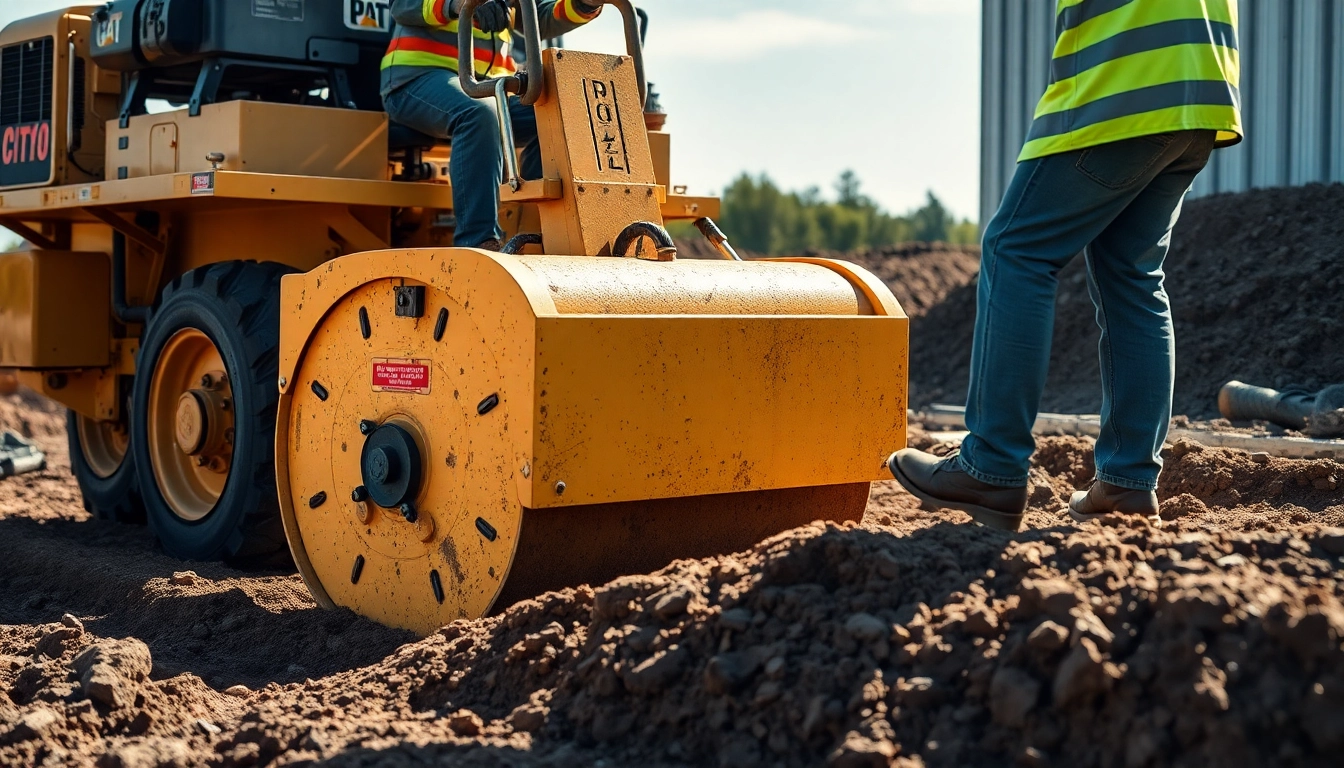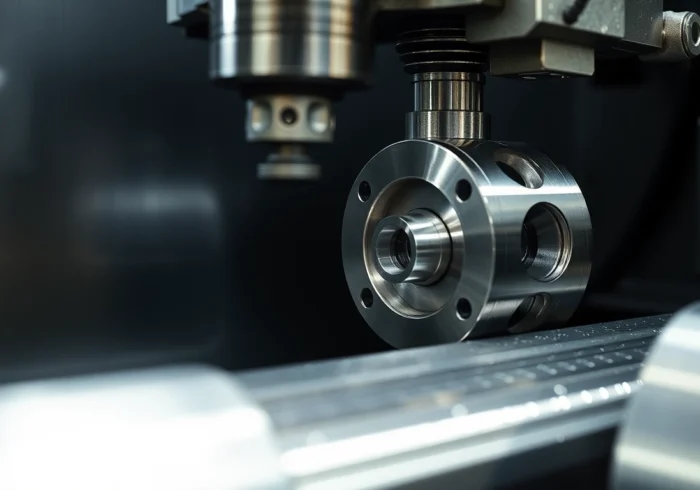Understanding Compactors and Their Role in Construction
In the realm of construction, landscaping, and infrastructure development, achieving a stable, solid foundation is paramount. Proper compaction of soil, gravel, asphalt, or other materials directly influences the durability, safety, and longevity of any project. This necessity has made compactors an indispensable piece of equipment, and the ability to rent these machines offers unparalleled flexibility and cost-efficiency for various industries. Whether you’re preparing a site for a new building, installing paving, or conducting landscaping work, understanding the functions, types, and benefits of renting compactors is essential to optimizing your project outcomes.
For those embarking on construction or landscaping projects, compactors rental provides access to a range of versatile, high-performance equipment tailored to different site requirements. This comprehensive guide delves into the types of compactors available, their applications, how to select the appropriate equipment, and best practices to ensure safety and efficiency—empowering you to make informed decisions that enhance productivity and project quality.
Types of Compactors Available for Rent
Compactors come in various forms, each designed to address specific materials, terrain conditions, and project scales. Selecting the right type is critical to ensuring effective compaction, minimizing costs, and preventing equipment damage. Here, we explore the most common compactors available for rent, their unique features, and ideal applications.
Plate Compactors (Wacker Plates)
Plate compactors, also known as wacker plates, are among the most popular rental choices for small to medium-sized projects. Their compact, robust design makes them ideal for confined spaces and detailed work such as paving driveways, patios, walkways, and trench backfilling. They feature a vibrating plate that rapidly oscillates, transmitting force directly into the material below to achieve dense compaction efficiently. Available in petrol, diesel, and electric variants, plate compactors are valued for their portability and ease of use.
Vibrating Rollers
Vibrating rollers are suited for larger-scale projects involving granular materials like gravel, sand, or asphalt. These machines feature a smooth or padded drum that vibrates to consolidate large quantities of material over expansive areas. They are often used in road construction, large paving projects, and foundation work. Their ability to cover significant ground speedily and their capacity to handle heavy loads make them indispensable for infrastructure projects.
Forward and Reversible Plate Compactors
These versatile machines feature a handle and are designed for easy maneuvering, particularly on slopes or tricky terrains. Reversible models allow operators to change direction without lifting the machine, increasing efficiency and reducing operator fatigue. They are suitable for delicate surface preparation, trench compaction, or small-scale site work.
Plate Rammers and Trench Rammers
For confined spaces like trenches, pipe bedding, or foundation footings, plate rammers provide concentrated force in a compact form. They are lightweight, portable, and excellent for tasks requiring precise control. Their compact size and powerful vibration make them perfect for restoring stability in narrow or confined zones.
Heavy-duty Earth Rollers and Pedestrian Rollers
Designed for larger construction sites, these roller types are employed to compact soil, clay, and other foundational materials. They come in single, double drum, or ride-on configurations, offering high-density compaction over extensive areas. These are essential for large infrastructure, highway, and airport projects where uniform and robust subbases are necessary.
Common Uses and Applications of Compactors
Compactors serve a broad spectrum of applications across different industries, underpinning the success of various construction and landscaping workflows. Here, we explore the most prevalent uses, demonstrating how effective equipment rental can streamline operations and improve outcomes.
Site Preparation and Ground Stability
One of the fundamental uses of compactors is soil stabilization. Proper compaction of the underlying soil prevents future settlement, reduces shifting, and provides a stable base for structures, foundations, or pavements. For instance, before laying a concrete slab or asphalt surface, ensuring the subgrade is thoroughly compacted minimizes the risk of uneven settlement or cracking later on.
Landscaping and Garden Projects
Landscape architects and homeowners frequently rent compactors for turf leveling, pathways, and patios. Compacting soil or aggregates creates a firm base that reduces erosion and maintains surface integrity. This is especially important for paths and driveways that endure daily traffic or heavy loads.
Paving and Road Construction
In paving projects, compactors are used to ensure asphalt or concrete layers are densely packed, which is crucial for structural strength and longevity. Road construction requires large-scale vibratory rollers to achieve smooth, durable surfaces capable of supporting transportation loads.
Trench and Utility Work
When installing pipes, cables, or drains, trench compactors or rammers are employed to compact backfill material, preventing future settling that could damage infrastructure or require costly repairs.
Building Foundations and Footings
On construction sites, deep compaction of the foundation base is critical for a stable, enduring building. Renting suitable compactors ensures uniform density, reduces settlement risks, and supports structure integrity.
Aggregates and Material Testing
Compactors are used in laboratory or field testing to evaluate the density and stability of materials, ensuring they meet project specifications and safety standards.
Choosing the Right Compactor for Your Project
Making an informed choice of equipment hinges on understanding project scope, material types, terrain conditions, and operational constraints. Here are key criteria to consider when selecting a rental compactor:
Material Type and Density Requirements
Determine whether you’ll be compacting soil, asphalt, gravel, or other materials. Different compactors provide varying force levels and surface contact areas, affecting their suitability. For example, asphalt requires high-frequency vibratory rollers, while loose soil benefits from plate compactors or rammers.
Area Size and Geometry
The extent and shape of the site influence equipment choice. Small, confined areas favor portable, lightweight plate compactors or rammers. Larger surfaces with extensive area coverage are better suited to vibratory rollers or heavy-duty compactors.
Terrain and Accessibility
Rough, uneven terrain necessitates robust, heavy-duty models with higher power and stability. Narrow or inaccessible spaces require compact, maneuverable units like reversible plate compactors or trench rammers.
Project Timeline and Budget
Timeline constraints might favor faster, larger equipment to accelerate completion. Budget limitations could make renting smaller, more affordable units preferable, especially if multiple project phases are involved.
Operator Skill Level and Safety
Some compactors are more straightforward to operate and require minimal training, whereas others necessitate experienced operators to maximize safety and efficiency. Always evaluate rental providers for training support and safety protocols.
Environmental and Site Conditions
Assess environmental factors such as noise restrictions, vibration impact, or presence of underground utilities to select the most suitable equipment that complies with local regulations and minimizes disruption.
Benefits of Renting Compactors for Your Business
Opting for rental equipment, especially compactors, offers a multitude of advantages that empower construction businesses, landscapers, and DIY enthusiasts alike. Here’s why equipment rental stands out as a strategic decision:
Cost-Effective Equipment Access
Purchasing high-quality compactors entails significant capital investment, ongoing maintenance, storage, and depreciation costs. Rental programs eliminate these expenses, allowing access to the latest models equipped with advanced features without upfront capital outlay. Furthermore, rental fees are often tax-deductible as operational expenses, providing additional financial benefits.
Flexibility and Versatility in Job Sites
Different projects require diverse equipment types. Renting offers the flexibility to select the ideal compactors for each task, whether it’s a small trench repair or a large asphalt paving project. Rentals also permit changing equipment based on evolving project needs or site conditions without long-term commitments.
Enhanced Efficiency and Work Quality
Modern compactors rented from reputable providers are regularly maintained and updated, ensuring optimal performance. Using the right equipment accelerates work processes, improves compaction quality, and reduces rework—saving time and money while elevating the project’s overall quality.
Reduced Operational Risks and Maintenance Burden
Rental providers typically handle routine maintenance and repairs, minimizing downtime and operational risks. This arrangement allows your team to focus on core tasks rather than equipment upkeep, enhancing productivity and safety.
Access to Specialized Equipment
Some projects require specialized compactors, such as high-capacity rollers or vibratory plates for specific materials. Renting ensures access to a broader range of machinery than perhaps available for purchase, enabling tailored solutions for complex or niche tasks.
How to Select a Reliable Compactors Rental Provider
Choosing a dependable supplier is crucial to ensuring your project remains on track and within budget. Here’s what to evaluate when selecting a rental provider:
Assessing Equipment Availability and Range
Verify that the rental company stocks a comprehensive selection of compactors suited to your needs. Diversity in models, sizes, and features ensures you can find precisely what matches your project specifications.
Equipment Condition and Maintenance Policies
Inspect the provider’s maintenance regime, equipment servicing history, and availability of replacement units. Well-maintained machines reduce breakdown risks and improve work quality.
Customer Support and Training Services
Reliable providers offer on-site or remote operator training, safety instructions, and responsive customer support. These services help you operate equipment safely and efficiently, minimizing accidents and delays.
Delivery, Pickup, and Flexibility
Convenient logistics support—such as prompt delivery, pickup options, and flexible rental periods—are essential to accommodate project schedules and reduce logistical headaches.
Pricing Transparency and Contract Terms
Compare quotes, review rental agreements, and clarify hidden costs or penalties. Transparent pricing and clear contractual terms save trouble and facilitate budgeting.
Reputation and Client References
Research reviews, testimonials, and references to gauge the provider’s reliability, professionalism, and quality of service.
Best Practices for Operating and Maintaining Rented Compactors
Proper operation and maintenance are critical to safeguarding your investment, ensuring safety, and achieving optimal results. Here are essential guidelines:
Safety Precautions and Operator Training
Always ensure operators receive instruction on equipment use, safety features, and hazard awareness. Use personal protective equipment (PPE) such as helmets, gloves, and ear protection. Regularly inspect the site for potential hazards before proceeding.
Proper Usage and Handling
Follow manufacturer’s operational guidelines, including starting procedures, operating speeds, and load capacities. Avoid overloading or misuse that could cause damage or accidents. Use appropriate attachments and modifications if required.
Routine Inspection and Maintenance Tips
Conduct daily checks for wear or damage, including vibration components, fuel levels, and overall integrity. Keep the equipment clean and lubricated, and promptly report or repair any faults. Regular maintenance prolongs equipment lifespan and maintains performance standards.
Environmental Considerations
Operate equipment within acceptable noise and vibration limits, especially in urban or sensitive areas. Ensure that fuel and oil leaks are avoided to prevent environmental contamination.
Documentation and Record-Keeping
Maintain records of inspections, maintenance, operation logs, and any incidents. Proper documentation aids compliance with safety regulations and facilitates troubleshooting.
Case Studies: Successful Projects Using Compactors Rental
Industrial Site Preparation
At a manufacturing plant expansion, a rental compactors fleet enabled swift soil stabilization, drastically reducing project timelines and costs. High-capacity vibratory rollers were used to prepare hundreds of square meters of ground for foundation pouring, ensuring a load-bearing capacity that met industry standards.
Landscaping and Paving Work
A landscaping company rented a series of lightweight plate compactors to prepare garden paths and terrace bases. The equipment’s mobility and ease of operation allowed rapid surface leveling, resulting in professional-grade finishes and satisfied clients.
Urban Infrastructure Development
During a city road rehabilitation project, contractors utilized large walk-behind vibratory rollers to compact asphalt efficiently. Rental agreements included onsite support, which minimized delays caused by equipment failure, ultimately contributing to project completion ahead of schedule.



